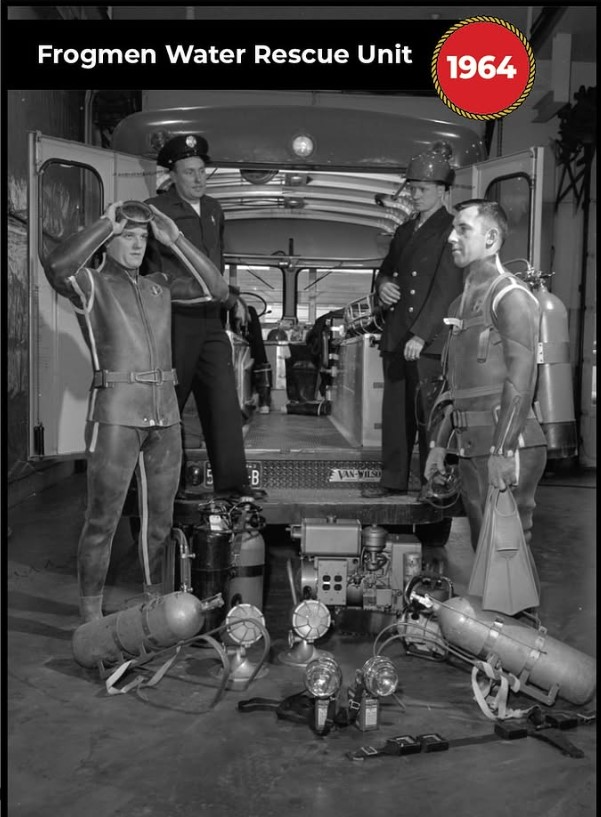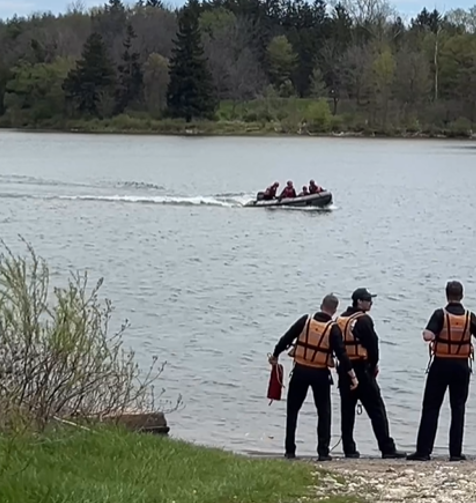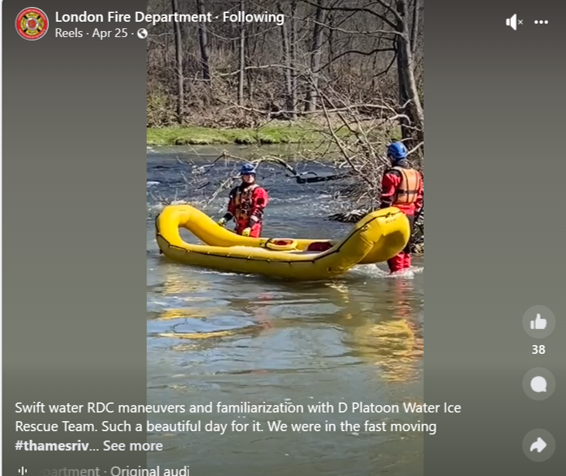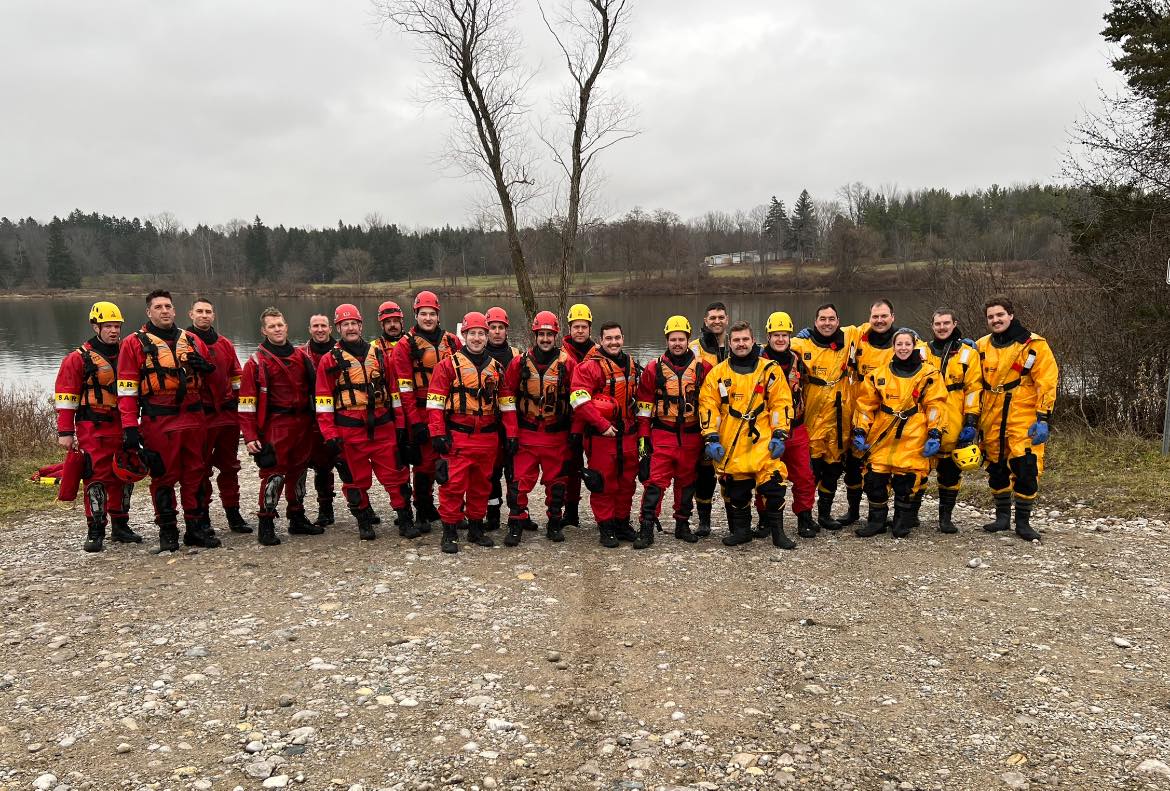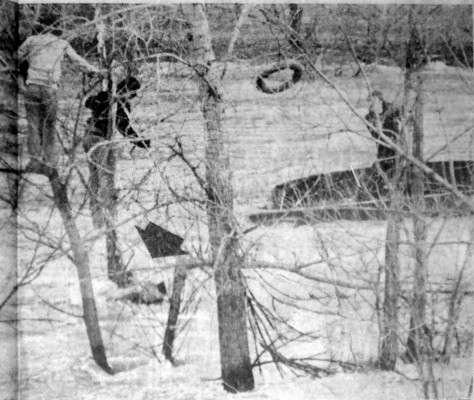
A firefighter attempts one of four tosses with a life ring to a fellow firefighter (arrow) after a boat capsized, throwing him into the swollen Thames River just below Fanshawe Dam Sunday. The firefighters were attempting to rescue two men clinging to trees at left.
(Photo by Sam McLeod of The London Free Press)
London East MP Charles Turner is demanding that a search and rescue helicopter be based in London for future emergencies.
“I’m writing to the minister of defence today and asking for this,” said the Liberal MP in a telephone interview from Ottawa today.
He said that the necessity of the U.S. Coast Guard making two rescue flights to London on the weekend made it painfully obvious that the area does not have proper protection. (Additional flood stories, pictures are on Pages 3, 4, 21, and 27.)
Turner’s fellow Liberal Larry Condon (London Middlesex) agreed that there is a need for more protection here.
“The Americans are great and we help them when we can, but some additional support at CFB London would be good.”
In its two flights, the U.S. Coast Guard plucked a total of 10 people from the torrent of the Thames River. In cold cash, it cost the U.S. government $1,142.40 for the rescue missions.
But for the coast guard, the cost might have been tallied in drowned bodies, and London firemen were fuming at the close call.

Ian Briglia
…ordeal cold, boring
Fire Captain Glen Lake strongly criticized the boaters who dared the river.
Fireman Paul McPherson agreed. “It could h
ave been a triple fatality or worse,” said the fireman who spent much of the weekend battling the muddy waters of the Thames.
The Detroit coast guard station is the closest rescue operation to London and has a helicopter ready to go in 15 minutes.
The closest Canadian operation is Trenton, which is on two-hour standby on the weekend and would take another half-hour to get here.
The provincial police have two smaller helicopters stationed in Toronto but a force spokesman explained that their lifting capabilities are minimal and could not be used in river rescues where straight lifting power is needed.
As for the Americans, they were ready, willing and able.
“As far as we are concerned, there is no border,” said Lt. Gerry Arens of the U.S. Coast Guard.
The chopper Seaguard Sikorsky, with a crew of three, costs $238 an hour to run – exclusive of crew time – and spent 4.8 hours rescuing wet Canadians.
Turner, from his Ottawa office, said London is big enough to handle its own rescue operations.
He said a rescue helicopter operating out of CFB London could cover all of Southwestern Ontario.
Although the Americans were making rescue incursions into Canadian territory, the Canadians were doing their part for the Americans at the eastern end of the Great Lakes.
A helicopter from Trenton found a downed aircraft near Watertown, N.Y.
Capt. Paul MacLean of the Trenton Search and Rescue Base said the two services “work hand in glove”.
“They work with us and we work with them . . . . There isn’t any compensation involved; it’s just a matter of who is the closest.”
Fireman McPherson, a diver, said he did a lot of swearing and paying while assisting the rescue of Londoners Dan Barbosa and Ian Briglia from the Thames River Sunday night. McPherson, who was forced into the river to escape a sinking fire department boat, watched colleague Ken Gilders nearly perish in the freezing, raging water.
It was the second time McPherson was in the river Sunday. He’d already helped rescue a man from a tree at the Thames Boat Club. That man had flipped a kayak.
Then he’d talked another man out of putting his canoe into the river at the Dundas Street bridge.

Dan Barbosa
…lost canoe in river
“Then we got a call there were two characters hanging onto a tree. And quote me on ‘characters.’ I’d like to have a talk to them . . . . They think it’s a lark and we nearly lost two guys.”
He’s solemn as he tells how close Gilders came to drowning.
“He was on the last tree. If he’d missed it, he would have ended up in the main course of the river. And that would have been the end of him.”
Unlike McPherson, Gilders wasn’t wearing a wet suit.
“But he was wearing a life jacket, thank God.” said McPherson.
McPherson described the tree Gilders was in as so small, “I don’t think a seagull could have stood on it.”
“The whole thing is so foolish, it never should have happened . . . . We have families too, and we lay down our lives every time we go in the river.”
Gilders said Sunday’s incident was his closest call in five years as a fireman. “And I’ve cheated death in other ways at fires and accidents.”
While hanging onto the tree, “I said my last farewell.”
But, he said, he was just doing his job.
Doing his job also cost him nearly $200 that was lost with his money clip in the river.
“I think those two boys learned the hard way. I don’t think they’ll ever forget it. I know I won’t.”
Stiff and scraped from holding onto the tree for more than an hour, Gilders just wanted to go home after being checked out of the hospital.
Another concern the firemen had Sunday night was what they agreed was “the antique, out-of-date equipment” available for rescue work.
Existing equipment is “highly inadequate,” McPherson said. The “city fathers” have got to realize that as long as there is a river running through the city and as long as there’s spring run-off, firemen are going to be called upon to rescue people.
“We definitely need more and better equipment.”
Rescue workers currently operate without lights, except for their diver’s lights, and with boats whose motors aren’t powerful enough to withstand the strong current, firemen said.
McPherson said there is some discussion of basing a rescue helicopter in London. He said provincial police told him they can’t use their helicopters at night.
He suggested the department obtain a jet boat, which would be powerful enough to withstand the current. Gilders suggested a dinghy.
All the firemen involved praised the work of an American helicopter crew which assisted in the rescue. McPherson said he was told it was the first time the crew lowered the rescue basket through trees.
Barbosa and Briglia were taken home by their parents.
Briglia said he hadn’t heard any warning about going into the river. The two hours in the tree were “cold and boring,” he said.
Before leaving the hospital, Barbosa thanked his rescuers. “ I appreciate the fire department a lot more now for sure,” he told Gilders.
The fireman asked him if he’d learned his lesson. “I don’t know about next year,” the 20-year-old replied.
“ I knew the water was fast and I thought I could make it and we didn’t get a quarter of a mile . . . . and I lost my canoe.”

